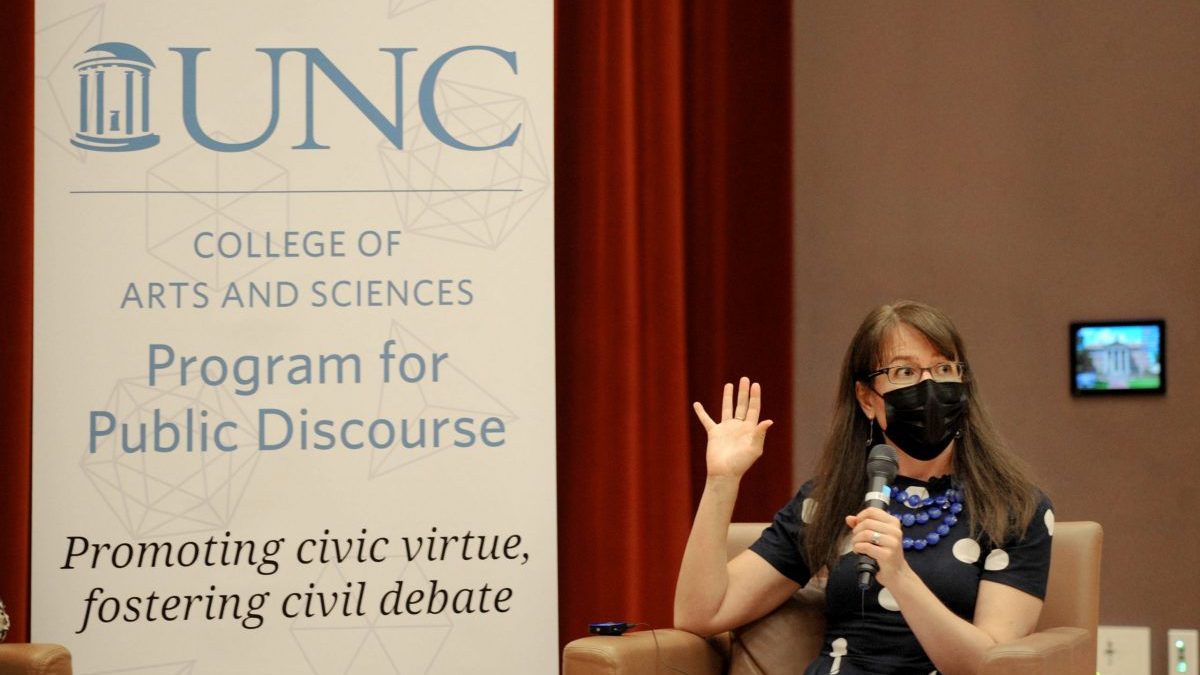A panel of faculty experts for “Democracy and Public Discourse” discussed polarization in today’s political landscape.

The polarization that marks America’s current political landscape may seem unprecedented, but it’s not that different from past eras. And it might not even be that bad, said one of four panelists at “Democracy and Public Discourse,” a 90-minute discussion hosted by the UNC Program for Public Discourse in the College of Arts & Sciences on Sept. 14.
“I’d like to put in a plug for polarization,” said Marc Hetherington, distinguished professor in political science in the College of Arts & Sciences.
“The roots of the polarization that we’re experiencing now are to be found in the civil rights movement of the 1950s and ’60s and the gender equality movement of the ’60s and ’70s and the LGBT rights movement of the ’90s,” Hetherington continued. “It’s a demonstrably better world as a result of those battles. Yeah, we’re experiencing a lot of discomfort, but it’s not for no reason.”
Molly Worthen, associate professor of history in the College of Arts & Sciences, moderated the hybrid event with around 60 audience members in the Mandela Auditorium in the FedEx Global Education Building and nearly 200 participants online.
Members of the interdisciplinary faculty panel looked at polarization from a variety of academic angles.
From a historical perspective, “I’m not sure we’re in a different place,” said Claude Clegg, distinguished professor in history and African, African American and diaspora studies in the College of Arts & Sciences and chair of the AAAD department. He compared the current climate with divisive politics during Bill Clinton’s presidency and the civil rights era.
Saying public discourse is broken today “presumes there was a point when it was in good repair,” he said. “Public discourse is going to be sloppy. It’s going to be fraught. That’s the price you pay.”
Polarization itself is not as concerning as the consequences of it, said Shannon McGregor, assistant professor at the Hussman School of Journalism and Media and senior researcher at the Center for Information, Technology and Public Life.
“Is polarization even the thing that we should be most concerned about?” she asked. Racial and social justice movements are polarizing but also pro-democratic, so “is the polarization a bad thing or is the anti-democratic movement against [social justice movements] the thing we should be concerned about?”
Polarization isn’t something that can be reasoned away, according to the researchers. “When people talk to each other across divides, we think the best way to do so is to marshal facts. Eventually I am going to fact you into submission,” said Kurt Gray, associate professor in psychology and neuroscience in the College of Arts & Sciences and adjunct associate professor at Kenan-Flagler Business School.
“It never works. You never change someone’s view on abortion based on statistics. But it turns out if you have personal experience to back your political beliefs,” he said, “those are the kind of things that make others see you as rational.”
Unfortunately, that lack of respect for facts makes the job of these very experts much harder.
“One thing all of us have learned is the notion of facts as an unstable thing. There’s a good amount of people around the world who are suspicious of expertise,” Clegg said. With access to the internet, many people believe they can do the research themselves and “should be suspicious of those who claim to be the experts.”
Perhaps the most divisive issue for the panelists was the notion of civility itself, especially in relation to free speech. Or, as a member of the in-person audience asked, “Just because you can say something, should you say it?”
“I think you should be able to express your views authentically,” Gray said, “but I don’t think you should say something just to twist the knife, like using a slur.”
Hetherington agreed. “How do you persuade people? Being uncivil generally doesn’t work to do that. It’s probably not good to start with calling names. You’re not going to get very far.”
But moderator Worthen pointed out that many progressives see a call for “civility” as a “call to silence voices that haven’t been heard and need to be heard.”
“I feel very torn about the idea of civility,” McGregor admitted. On the one hand, she doesn’t think people should be so quick to lash out in anger on social media. But incivility may be called for sometimes.
“When your human rights and your ability to have any power within this society is being threatened, how can you come back with civility to someone who doesn’t respect you fundamentally as an individual?” she asked.
In her closing remarks, moderator Worthen advised participants to pursue the kind of “thoughtful reflection” encouraged at the University instead of adding to the current discord. “It’s the one hope to assert some order over the chaos,” she said.
By Susan Hudson, The Well
